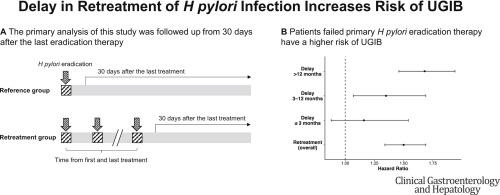Clinical Gastroenterology and Hepatology ( IF 11.6 ) Pub Date : 2020-04-11 , DOI: 10.1016/j.cgh.2020.03.071 Chuan-Guo Guo 1 , Ka Shing Cheung 1 , Feifei Zhang 2 , Esther W Chan 3 , Lijia Chen 1 , Ian C K Wong 4 , Wai K Leung 1

|
Background & Aims
Little is known about risk of upper gastrointestinal bleeding (UGIB) in patients failed by Helicobacter pylori eradication therapy. We investigated the effects of different time until retreatment, after failure of initial H pylori eradication therapy, on subsequent risk of UGIB.
Methods
We performed a territory-wide retrospective cohort study of 70,518 patients with H pylori infection who had received their first course of clarithromycin-based triple therapy from January 2003 through December 2012 in Hong Kong. Patients who required retreatment after failed initial therapy (n = 8330, 11.8%) were categorized based on time between initial and final H pylori eradication (3 months or less, 3–12 months, and more than 12 months). We collected clinical data from 30 days after prescription of the last course of H pylori therapy until hospitalization for non-variceal UGIB, death, or the end of the study (30 Jun 2016; median follow-up time, 7.65 years). The primary outcome was difference in development UGIB (determined from ICD-9 codes) between patients who required retreatment and those who did not (reference group).
Results
Compared with the reference group, patients who required retreatment had an overall higher risk of UGIB, even after last eradication therapy (adjusted hazard ratio (HR), 1.50, 95% CI, 1.34–1.69). There was a progressive increase in risk of UGIB with longer time from initial until final eradication therapy: hazard ratio for time less than 3 months, 1.16; 95% CI, 0.88–1.54, hazard ratio for time 3–12 months, 1.35; 95% CI, 1.07–1.69, and hazard ratio for time more than 12 months, 1.68; 95% CI, 1.46–1.94 (P for trend = .038).
Conclusion
In a retrospective study of patients in Hong Kong, we found that those failed by initial H pylori eradication have an increased risk of UGIB, compared to patients who responded to the initial therapy. Risk increased progressively with longer time until retreatment. Early retreatment within 3 months should be considered to minimize subsequent UGIB risk.









































 京公网安备 11010802027423号
京公网安备 11010802027423号